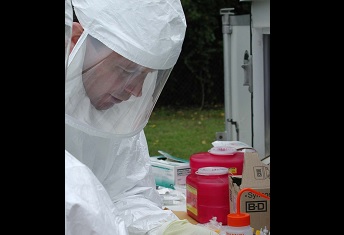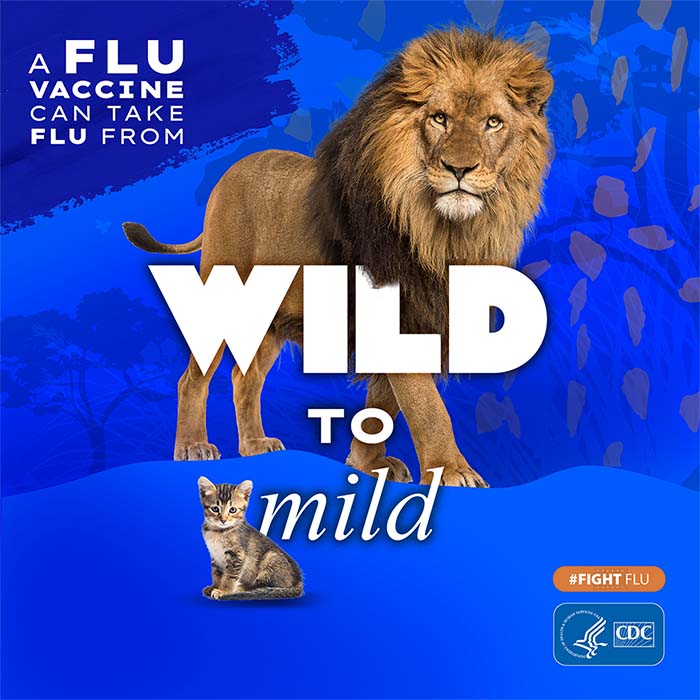Flu Fighter: James C. Kile
Meet Dr. James C. Kile, public health veterinarian and lead of the Animal-Human Interface Team in CDC Influenza Division’s Epidemiology and Prevention Branch (EPB). In support of influenza pandemic preparedness, Dr. Kile and his team focus on preventing the spread of influenza viruses from animals to people. He supports multiple projects with state, federal, and academic partners aimed at detecting and monitoring animal and zoonotic influenza viruses (i.e., influenza viruses that spread between animals and people), both domestically and internationally. “Influenza viruses are regularly found in humans and many animal species, and they are transmissible to many other animals and change constantly. It is important not only to develop effective human seasonal vaccines for people, but also to monitor and control the influenza viruses circulating in animals and to assess these viruses when needed to determine their pandemic potential,” says Dr. Kile.
Name: James C. Kile
Title: Health Scientist, Acting IRAT Coordinator, and Lead of the Animal-Human Interface Team
Location: Atlanta, GA
- What role do you play in fighting flu?
I serve as the lead of the Animal-Human Interface Team in the Epidemiology and Prevention Branch of CDC’s Influenza Division. I provide technical expertise on animal and zoonotic influenza viruses and disease, with a focus on preventing the spread of influenza from animals to people and helping to prevent influenza pandemics. Also, I support multiple projects, such as the Zoonotic Influenza Reference Guide, with state, federal, and academic partners aimed at detecting and monitoring animal and zoonotic influenza viruses domestically and internationally. Finally, I am the acting coordinator of the CDC Influenza Risk Assessment Tool (IRAT), which is used to assess the potential pandemic risk posed by influenza A viruses that spread in animals but not in humans.
- What is the most rewarding part of your work?
Influenza is a challenging virus and disease to work with. Fortunately, CDC’s Influenza Division has an amazing group of influenza experts. Whether discussing influenza disease investigations, virus research, animal and human influenza virus transmission, influenza vaccine effectiveness, candidate vaccine viruses, or policy recommendations and communication, there are colleagues who are proficient in these areas who can assist with understanding influenza’s complexities.
- What is the most difficult part of your work?
Influenza A viruses specifically, change constantly and are extremely diverse, which is the challenge of working with these viruses. There are seven animal groups or species, including humans, in which influenza viruses are endemic, i.e., spread and are found regularly, and there are countless other animal species that can be infected with influenza viruses. It is rewarding yet also quite challenging to monitor these viruses and the animals they infect. We try to understand which influenza viruses that spread among the different animal species might become the next influenza virus of concern to humans, so that we can prepare for and try to prevent the next influenza pandemic.
- How serious is flu? What should people know about the risk of flu?
Influenza A viruses are very serious pathogens to both human and animal health. Human morbidity and mortality from seasonal influenza is significant every year. If an animal influenza virus comes along that not only can infect people but also can spread easily among people, it could pose a high risk of causing a pandemic. It is important not only to develop effective human seasonal vaccines for people but also to monitor and control the influenza viruses circulating in animals and assess these viruses, when needed, to determine their pandemic potential.
- What would you say to those who are hesitant to get the flu vaccine?
Influenza is a very serious disease. If infected, your illness could be mild or severe, and you might even be hospitalized. In addition, there is the possibility that you could infect your family and friends. With influenza, it is better to be vaccinated and safe, rather than sorry.



